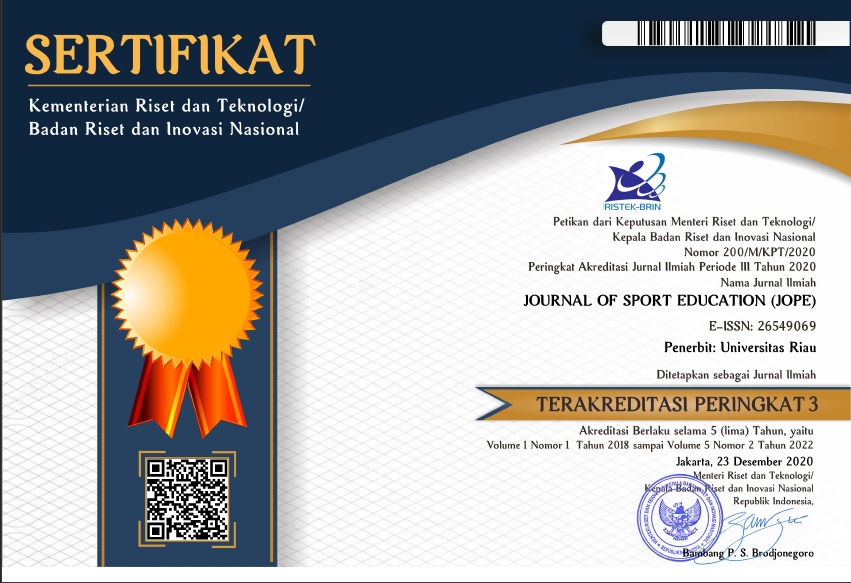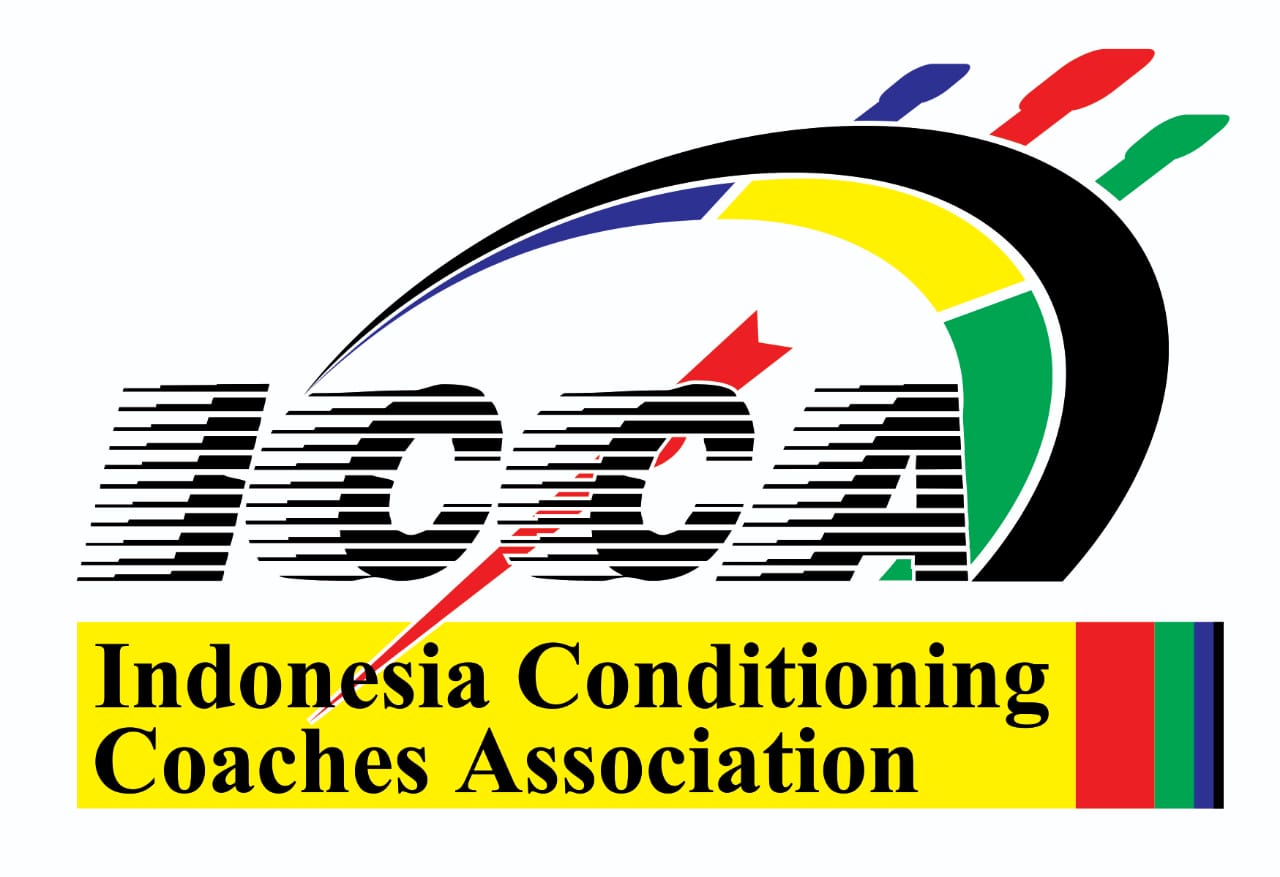The meaning of recreational sports for modern society as a lifestyle to stay active and fit
Abstract
(English)
This research explores the meaning of recreational sports for modern society as a lifestyle to stay active and fit. This qualitative research uses a phenomenological approach in Salatiga City in several open and closed sports venues and open sports facilities provided by the city government. The population is an urban community that does recreational sports. Random sampling in this study totaled twenty-five respondents from various sports community groups and individually. Data collection techniques used in-depth interviews. The data analysis technique uses the method from Milles and Huberman, which is divided into four stages: data collection, data reduction, data presentation, and conclusion. The results found are that modern society does not know the definition of recreational sports well; they do recreational sports in their free time to maintain fitness, recreational sports are used as a lifestyle with the family, and the environment and mass media are supporting factors in understanding and accessibility in doing recreational sports. This research concludes that modern society needs to understand recreational sports better. However, they consciously do it with internal motivation and support from the environment, including family and mass media.
(Indonesian)
Penelitian ini bertujuan untuk menggali makna olahraga rekreasi bagi masyarakat modern sebagai gaya hidup untuk tetap aktif dan bugar. Penelitian ini merupakan penelitian kualitatif dengan pendekatan fenomenologi dilakukan di Kota Salatiga di beberapa tempat olahraga terbuka dan tertutup juga di fasilitas olahraga terbuka yang disediakan oleh pemerintah kota. Partisipan merupakan masyarakat Kota Salatiga yang melakukan olahraga rekreasi. Partisipan yang diambil dalam penelitian ini berjumlah total dua puluh lima responden dari berbagai kelompok komunitas olahraga maupun secara individu. Teknik pengumpulan data menggunakan in-dept interview. Teknik analisis data menggunakan metode dari Milles dan Huberman yang dibagi menjadi 4 tahapan yaitu pengumpulan data, reduksi data, penyajian data, dan penarikan kesimpulan. Hasil yang ditemukan adalah masyarakat modern belum mengetahui definisi olahraga rekreasi dengan baik, mereka melalukan olahraga rekreasi di waktu luang untuk menjaga kebugaran, olahraga rekreasi dijadikan gaya hidup bersama keluarga, lingkungan dan media masa menjadi faktor pendukung dalam pemahaman dan aksesibilitas dalam melakukan olahraga rekreasi. Kesimpulan penelitian ini adalah masyarakat modern belum memaknai dengan baik olahraga rekreasi, namun secara sadar mereka melakukannya dengan motivasi internal dan juga dukungan dari lingkungan termasuk keluarga dan media masa.
Copyright © The Author (s) 2023

Keywords
References
Aksoy, Y., & Arslan, O. (2019). Effects of Recreational Activity on Leisure Barriers between Students. Asian Journal of Education and Training, 5(4), 569–574. https://doi.org/10.20448/journal.522.2019.54.569.574
Alhabash, S., & Ma, M. (2017). A Tale of Four Platforms: Motivations and Uses of Facebook, Twitter, Instagram, and Snapchat Among College Students? Social Media + Society, 3(1), 205630511769154. https://doi.org/10.1177/2056305117691544
Amati, V., Meggiolaro, S., Rivellini, G., & Zaccarin, S. (2018). Social relations and life satisfaction: the role of friends. Genus, 74(1), 7. https://doi.org/10.1186/s41118-018-0032-z
Arundell, L., Salmon, J., Timperio, A., Sahlqvist, S., Uddin, R., Veitch, J., Ridgers, N. D., Brown, H., & Parker, K. (2022). Physical activity and active recreation before and during COVID-19: The Our Life at Home study. Journal of Science and Medicine in Sport, 25(3), 235–241. https://doi.org/10.1016/j.jsams.2021.10.004
Axelrod, R. H. (2017). Leadership and Self-Confidence (pp. 297–313). https://doi.org/10.1007/978-3-319-31036-7_17
Bliss, L. A. (2016). Phenomenological Research. International Journal of Adult Vocational Education and Technology, 7(3), 14–26. https://doi.org/10.4018/IJAVET.2016070102
Cahyo Wibowo, Alwin Praiman Hulu, & Dennys Christovel Dese. (2023). Phenomenological Study: Recreational Sports in Urban Society. Indonesian Journal of Sport Management, 3(2).
Campbell, B. (2021). Social Justice and Sociological Theory. Society, 58(5), 355–364. https://doi.org/10.1007/s12115-021-00625-4
Carlsson, G., Slaug, B., Schmidt, S. M., Norin, L., Ronchi, E., & Gefenaite, G. (2022). A scoping review of public building accessibility. Disability and Health Journal, 15(2), 101227. https://doi.org/10.1016/j.dhjo.2021.101227
Cianconi, P., Betrò, S., & Janiri, L. (2020). The Impact of Climate Change on Mental Health: A Systematic Descriptive Review. Frontiers in Psychiatry, 11. https://doi.org/10.3389/fpsyt.2020.00074
Cobigo, V., Martin, L., & Mcheimech, R. (2016). Understanding Community. Canadian Journal of Disability Studies, 5(4), 181. https://doi.org/10.15353/cjds.v5i4.318
Cordova, R., Kliemann, N., Huybrechts, I., Rauber, F., Vamos, E. P., Levy, R. B., Wagner, K.-H., Viallon, V., Casagrande, C., Nicolas, G., Dahm, C. C., Zhang, J., Halkjær, J., Tjønneland, A., Boutron-Ruault, M.-C., Mancini, F. R., Laouali, N., Katzke, V., Srour, B., … Freisling, H. (2021). Consumption of ultra-processed foods associated with weight gain and obesity in adults: A multi-national cohort study. Clinical Nutrition, 40(9), 5079–5088. https://doi.org/10.1016/j.clnu.2021.08.009
Dwivedi, Y. K., Ismagilova, E., Rana, N. P., & Raman, R. (2023). Social Media Adoption, Usage And Impact In Business-To-Business (B2B) Context: A State-Of-The-Art Literature Review. Information Systems Frontiers, 25(3), 971–993. https://doi.org/10.1007/s10796-021-10106-y
Festini, S. B., Hertzog, C., McDonough, I. M., & Park, D. C. (2019). What makes us busy? Predictors of perceived busyness across the adult lifespan. The Journal of General Psychology, 146(2), 111–133. https://doi.org/10.1080/00221309.2018.1540396
Filo, K., Lock, D., & Karg, A. (2015). Sport and social media research: A review. Sport Management Review, 18(2), 166–181. https://doi.org/10.1016/j.smr.2014.11.001
Fitri, M., Zainal Abidin, N. E., Novan, N. A., Kumalasari, I., Haris, F., Mulyana, B., Khoo, S., & Yaacob, N. (2022). Accessibility of Inclusive Sports Facilities for Training and Competition in Indonesia and Malaysia. Sustainability, 14(21), 14083. https://doi.org/10.3390/su142114083
Galaviz, K. I., Narayan, K. M. V., Lobelo, F., & Weber, M. B. (2018). Lifestyle and the Prevention of Type 2 Diabetes: A Status Report. American Journal of Lifestyle Medicine, 12(1), 4–20. https://doi.org/10.1177/1559827615619159
Garrick, J. G., & Requa, R. K. (2003). Sports and Fitness Activities: The Negative Consequences. Journal of the American Academy of Orthopaedic Surgeons, 11(6), 439–443. https://doi.org/10.5435/00124635-200311000-00008
Guan, N., Guariglia, A., Moore, P., Xu, F., & Al-Janabi, H. (2022). Financial stress and depression in adults: A systematic review. PLOS ONE, 17(2), e0264041. https://doi.org/10.1371/journal.pone.0264041
Guzel, A. E., Arslan, U., & Acaravci, A. (2021). The impact of economic, social, and political globalization and democracy on life expectancy in low-income countries: are sustainable development goals contradictory? Environment, Development and Sustainability, 23(9), 13508–13525. https://doi.org/10.1007/s10668-021-01225-2
Haleem, A., Javaid, M., Qadri, M. A., & Suman, R. (2022). Understanding the role of digital technologies in education: A review. Sustainable Operations and Computers, 3, 275–285. https://doi.org/10.1016/j.susoc.2022.05.004
H.E. Aliyev, & E.E. Mammadov. (2022). THE IMPACT OF MASS MEDIA ON SPORT. Scientific News of Academy of Physical Education and Sport, 4(2), 34–37. https://doi.org/10.28942/ssj.v4i2.507
Herzog, W. (2018). Do recreational team sports provide fitness and health benefits? Journal of Sport and Health Science, 7(2), 127–128. https://doi.org/10.1016/j.jshs.2018.01.001
Kulzhanova, Z. T., Kulzhanova, G. T., Mukhanbetkaliyev, Y. Ye., Kakimzhanova, M. K., & Abdildina, K. S. (2020). Impact of Technology on Modern Society—A Philosophical Analysis of the Formation of Technogenic Environment. Media Watch. https://doi.org/10.15655/mw/2020/13082020
Lawton, E., Brymer, E., Clough, P., & Denovan, A. (2017). The Relationship between the Physical Activity Environment, Nature Relatedness, Anxiety, and the Psychological Well-being Benefits of Regular Exercisers. Frontiers in Psychology, 8. https://doi.org/10.3389/fpsyg.2017.01058
Lee, Y., & Lim, S. (2019). Effects of Sports Activity on Sustainable Social Environment and Juvenile Aggression. Sustainability, 11(8), 2279. https://doi.org/10.3390/su11082279
Malm, C., Jakobsson, J., & Isaksson, A. (2019a). Physical Activity and Sports—Real Health Benefits: A Review with Insight into the Public Health of Sweden. Sports, 7(5), 127. https://doi.org/10.3390/sports7050127
Malm, C., Jakobsson, J., & Isaksson, A. (2019b). Physical Activity and Sports—Real Health Benefits: A Review with Insight into the Public Health of Sweden. Sports, 7(5), 127. https://doi.org/10.3390/sports7050127
McDonald, R. I., & Crandall, C. S. (2015). Social norms and social influence. Current Opinion in Behavioral Sciences, 3, 147–151. https://doi.org/10.1016/j.cobeha.2015.04.006
McKenna, A., Mcmartin, F., Terada, Y., Sirivedhin, V., & Agogino, A. (2001). A Framework for Interpreting Students Perceptions of an Integrated Curriculum.
Miranda, L., & Freeman, J. (2020). The two types of society: Computationally revealing recurrent social formations and their evolutionary trajectories. PLOS ONE, 15(5), e0232609. https://doi.org/10.1371/journal.pone.0232609
Mofatteh, M. (2021). Risk factors associated with stress, anxiety, and depression among university undergraduate students. AIMS Public Health, 8(1), 36–65. https://doi.org/10.3934/publichealth.2021004
Morrison-Smith, S., & Ruiz, J. (2020). Challenges and barriers in virtual teams: a literature review. SN Applied Sciences, 2(6), 1096. https://doi.org/10.1007/s42452-020-2801-5
Newhouse-Bailey, M., Dixon, M. A., & Warner, S. (2015). Sport and Family Functioning: Strengthening Elite Sport Families. Journal of Amateur Sport, 1(2), 1–26. https://doi.org/10.17161/jas.v0i0.4934
Ouyang, Y., Wang, K., Zhang, T., Peng, L., Song, G., & Luo, J. (2020). The Influence of Sports Participation on Body Image, Self-Efficacy, and Self-Esteem in College Students. Frontiers in Psychology, 10. https://doi.org/10.3389/fpsyg.2019.03039
Pilar, P.-M., Rafael, M.-C., Félix, Z.-O., & Gabriel, G.-V. (2019). Impact of Sports Mass Media on the Behavior and Health of Society. A Systematic Review. International Journal of Environmental Research and Public Health, 16(3), 486. https://doi.org/10.3390/ijerph16030486
Rojas, M., Méndez, A., & Watkins-Fassler, K. (2023). The hierarchy of needs empirical examination of Maslow’s theory and lessons for development. World Development, 165, 106185. https://doi.org/10.1016/j.worlddev.2023.106185
Rutledge, P. B., & Hogg, J. L. C. (2020). In‐Depth Interviews. In The International Encyclopedia of Media Psychology (pp. 1–7). Wiley. https://doi.org/10.1002/9781119011071.iemp0019
Strandbu, Å., Bakken, A., & Stefansen, K. (2020). The continued importance of family sport culture for sport participation during the teenage years. Sport, Education and Society, 25(8), 931–945. https://doi.org/10.1080/13573322.2019.1676221
Vo, T. T. D., Tuliao, K. V., & Chen, C.-W. (2022). Work Motivation: The Roles of Individual Needs and Social Conditions. Behavioral Sciences, 12(2), 49. https://doi.org/10.3390/bs12020049
Williams, H. (2021). The Meaning of “Phenomenology”: Qualitative and Philosophical Phenomenological Research Methods. The Qualitative Report. https://doi.org/10.46743/2160-3715/2021.4587
Yahya, T., & Yahya, S. (2020). Social Characteristics and Differences of Urban and Rural Communities. Journal La Sociale, 1(5), 24–27. https://doi.org/10.37899/journal-la-sociale.v1i5.204
Yin, L., & Yan, Y. (2021). Science and Technology Through Mass Media. In Science Communication Practice in China (pp. 169–196). Springer Singapore. https://doi.org/10.1007/978-981-16-3203-7_9
DOI: http://dx.doi.org/10.31258/jope.6.1.1-18
Refbacks
- There are currently no refbacks.











